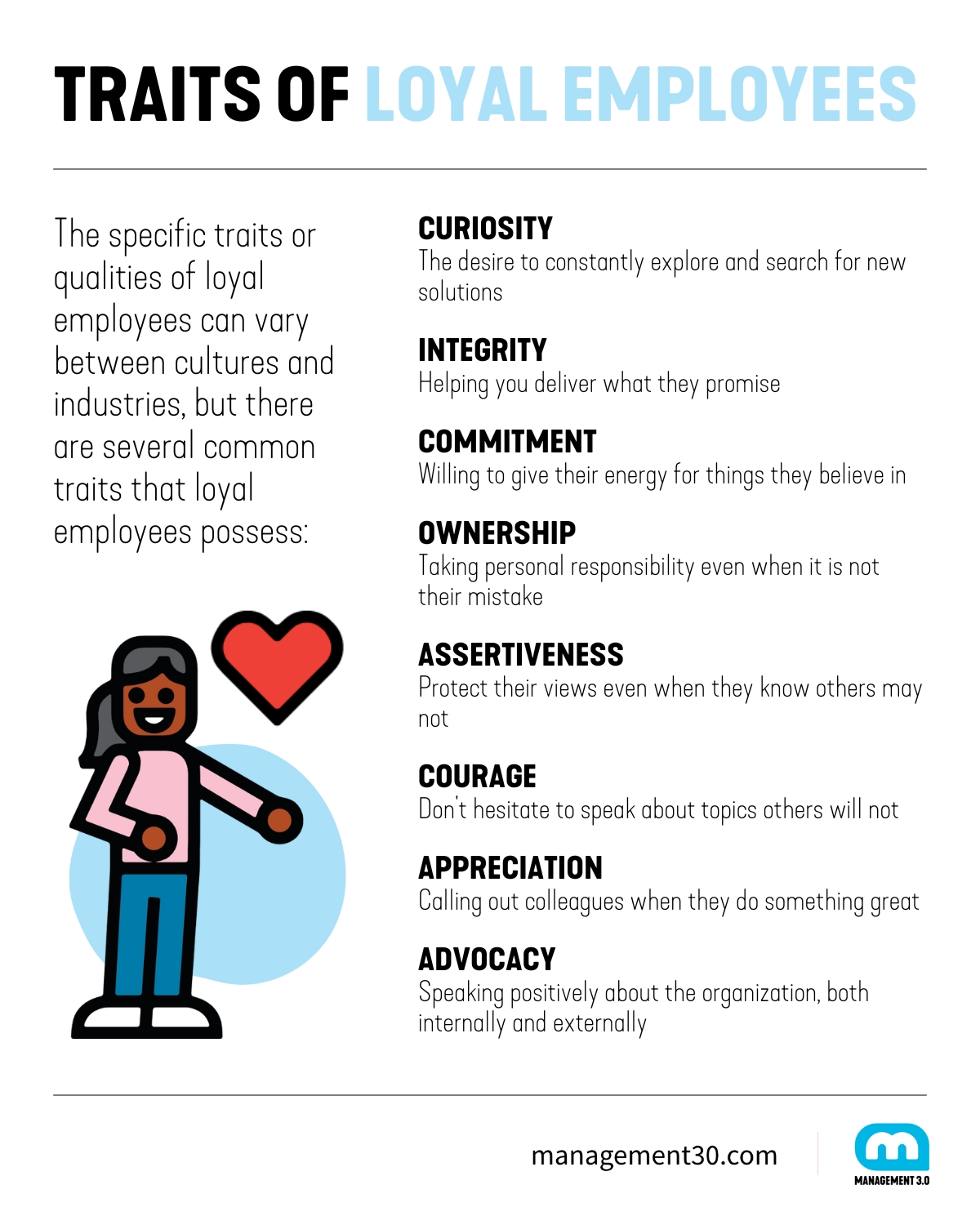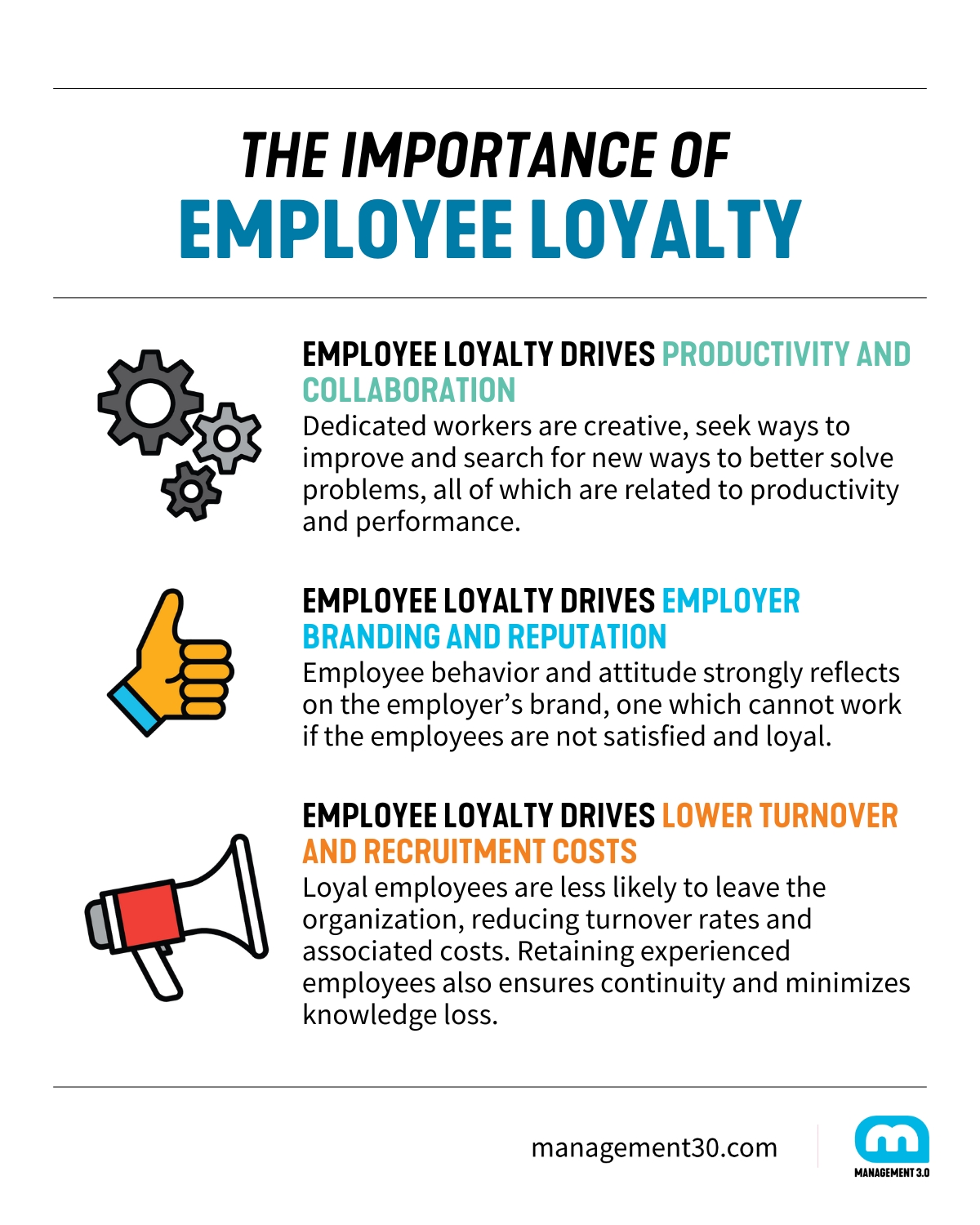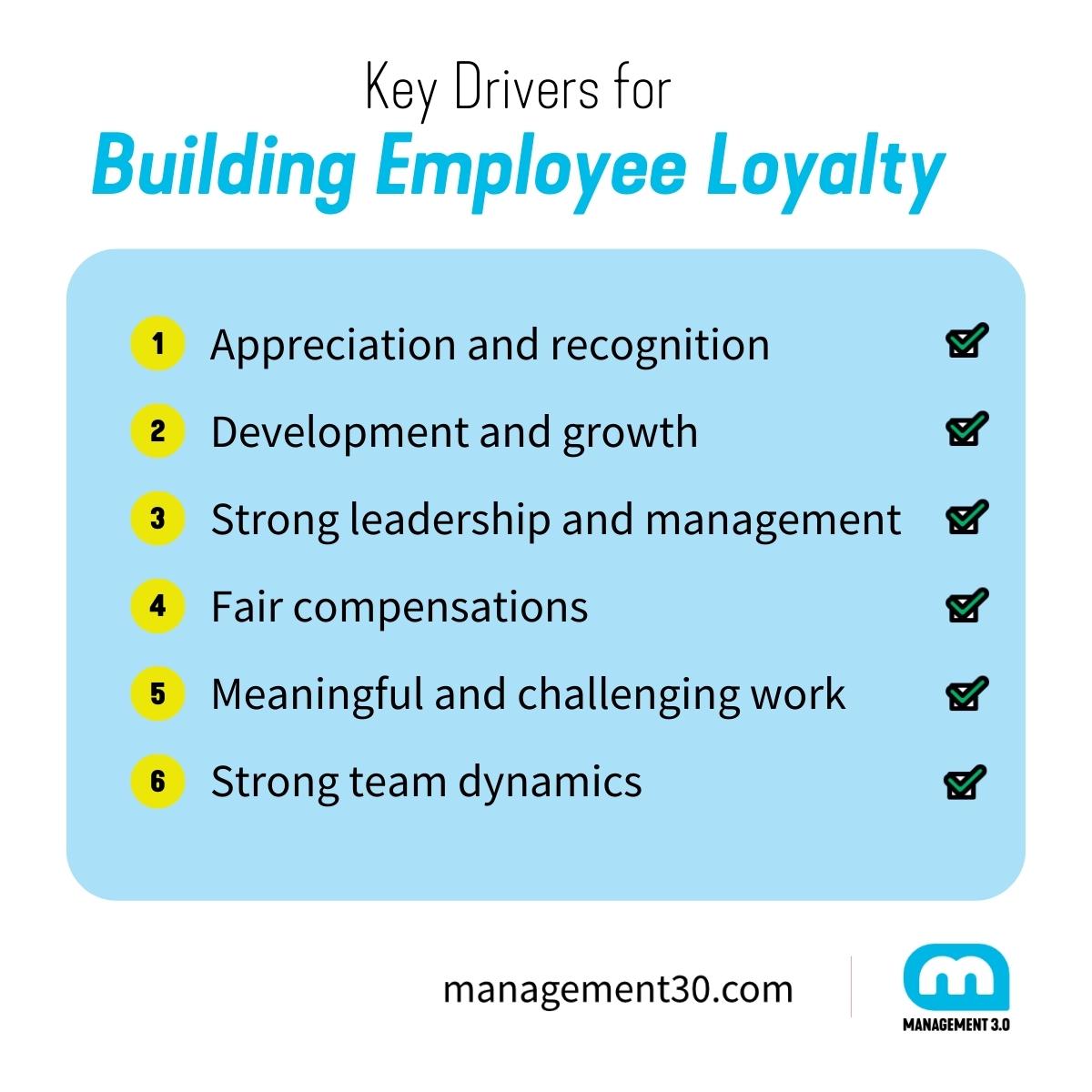In the post-Covid era, employers must prioritize employee loyalty by understanding core needs and drivers. Building a strong connection, fostering well-being, and promoting development are crucial for retaining talent and creating a positive work experience. Management 3.0 Facilitator Ilija Popjanev digs into employee loyalty, what it means, why it is important, and how to foster it.
- What is employee loyalty?
- What are the traits of loyal employees?
- Why is employee loyalty important?
- How do you build employee loyalty?
- How can we measure employee loyalty?
The Covid-19 pandemic has impacted not only an employee’s expectations of their work experience, but it has also affected what employers have to deliver so they can retain their talent. Focusing only on employee motivation and engagement in the form of raises and bonuses is not enough anymore. In the post Covid-19 era, employers have to rethink and redesign the entire employee experience by discovering core employee needs and drivers and focusing more on their wellbeing and development. Finding the core drivers is essential because their presence will improve the employee experience, as reflected through resulting creativity, productivity and loyalty.
The post Covid-19 period brings many new HR trends. The Great Resignation started in 2021, followed by “quiet quitting” as a form of disengagement, mostly affecting Gen Z. Then came the recent layoffs in big IT companies, who began downsizing more than 20% of their human potential as fast growing “AI vs. Human” trends are being implemented in various forms, leading to decreased employee loyalty and trust in their organizations. Now is the right time for human centric companies to implement new strategies for improving employee loyalty.
What is employee loyalty?
Employee loyalty goes beyond mere job satisfaction or tenure. It implies a deep sense of connection and emotional attachment to the organization, its mission, values, and culture. Loyal employees are typically motivated to go the extra mile, exhibit discretionary effort, and actively promote the company’s interests.
Loyal employees strive to achieve goals and bring success for their employer by going above and beyond, by sacrificing their time, energy, and interests in the name of the company. Dedicated employees are accountable and committed, and they will express their loyalty by staying and being enthusiastic about their work, while promoting the brand to their friends and the outside world.
Employee loyalty is represented as a set of emotions that create a strong bond between the employee and the employer, when they share the same values and goals, and have established enough trust and respect that the employees would like to stay and promote the company publicly.
Employee loyalty works on the reciprocity principle: the employees are committed to the success of the company, and the employers are committed to their employees. That is why fostering company loyalty requires increasing the employee experience, while at the same time decreasing negative emotions and unmet needs.
If employees feel that the organization always wants the best for them, they will continue to do the best they can, avoiding the search for a new job. When considering that employee loyalty is one of the key elements of managing successful companies, employers have to find a way to make their hires stay longer.
What are the traits of loyal employees?
The specific traits or qualities of loyal employees can vary between cultures and industries, but there are several common traits that loyal employees possess. Key characteristics of employee loyalty may include:
- Learnability – Passionate to grow, adapt and improve their skills
- Curiosity – The desire to constantly explore and search for new solutions
- Integrity – Helping you deliver what they promise
- Commitment – Willing to give their energy for things they believe in
- Ownership – Taking personal responsibility even when it is not their mistake
- Assertive – Protect their views even when they know others may not
- Courage – Don’t hesitate to speak about topics others will not
- Appreciation – Calling out colleagues when they do something great
- Advocacy – Speaking positively about the organization, both internally and externally, acting as ambassadors, promoting the company’s products, services, and reputation.

Why is employee loyalty important, why does it matter?
A workforce composed of loyal and engaged employees can provide a competitive advantage in the marketplace. Loyal employees contribute to organizational success, differentiation, and sustainable growth, giving the organization an edge over competitors.
Employee loyalty drives productivity and collaboration
Loyalty encourages collaboration between employees who understand they are sharing the same goals, purpose and vision. Dedicated workers are creative, seek ways to improve and search for new ways to better solve problems, all of which are related to productivity and performance. (Learn more about how Management 3.0 can help you improve your problem solving skills.) Since loyal employees are process improvers and change agents, they can increase effectiveness and generate organizational growth by sharing their knowledge with other internal teams.

Management 3.0’s Celebration Grid is a visual improvement tool for keeping the track of ongoing tasks and projects.
Dedicated employees bring enthusiasm and passion to daily operations, influencing others in achieving common goals by making a positive impact on the work itself.
Employee loyalty drives employer branding and reputation
Employee behavior and attitude strongly reflects on the employer’s brand, one which cannot work if the employees are not satisfied and loyal. They are building the products and delivering services to customers who will be satisfied only when professional and dedicated employees are serving them. When the company gives benefits to its employees and cares about their wellbeing, they will stay devoted to their job and provide support that will retain customers.
Employees that are devoted to their organizations and live its values, can foster those values to each customer they interact with, so that customer loyalty will increase, as will the brand’s reputation and image.

Find out if your values align with your company values with the Big Values List.
Employee loyalty drives lower turnover and recruitment costs
High employee turnover can be costly for organizations in terms of recruitment, onboarding, and training. Loyal employees are less likely to leave the organization, reducing turnover rates and associated costs. Retaining experienced employees also ensures continuity and minimizes knowledge loss.
By reducing turnover, increasing productivity, and improving customer satisfaction, employee loyalty can lead to significant cost savings for organizations. These savings can be reinvested into employee development, organizational growth, and other strategic initiatives.
Furthermore, employee loyalty is vital because it cultivates a positive organizational culture, encourages knowledge sharing and innovation, and contributes to stability and resilience. It fosters a supportive work environment, promotes collaboration and learning, and enables the organization to adapt and thrive in challenging circumstances.

How do you build employee loyalty?
Employers have to increase loyalty through enhancing employee experience by creating a culture in which employees feel valued and appreciated. Employers should strive to provide fair pay, benefits and opportunities for career growth. Employees should be encouraged to speak up and share their opinions and concerns in a psychologically safe environment. Let us “Manage the system, not the people” if we want to promote loyalty and create strong and lasting bonds between the employee and the employer.
The key drivers of employee loyalty can vary depending on the organization and its specific context. Let us review the most important ones and see how you can leverage them when applying Management 3.0.
Improve employee loyalty at your organization: appreciation and recognition
Core human emotional needs include feeling valued, respected and included in the organization. Employers need to be more empathic than before and cultivate a strong sense of appreciation and recognition if they want to build loyal employees who are willing to go the extra mile and give the best they can.
Praising employees should not only cover “jobs well done”, reaching goals and business results, but it should also extend to changes of behavior, instilling new values, supporting colleagues, and knowledge sharing.

Install Kudo Cards for your team or your organization as a whole to make peer-to-peer appreciation and recognition a habit.
Employees who believe that management is concerned about them as a whole person, not just an employee, are more productive, more satisfied, more fulfilled. Satisfied employees mean satisfied customers, which leads to profitability.
Anne M. Mulcahy, former CEO of Xerox

Build employee loyalty through development and growth
To love their jobs, employees need empowerment, mentoring and support for achieving their goals. Employees who feel that they are stagnating in their skills and career are more likely to leave their companies.
Building effective onboarding and training processes reinforces organizational performance. If leaders fail to establish psychological safety and learning, organizations will not meet the key expectations that people have in today’s VUCA world. Building a learning organization should be a top leadership priority during these volatile times.

By setting up a Team Competence Matrix you can create transparency when developing people’s competencies and learn how to fill the gaps. The tool helps companies to understand what employees want to learn and is aligned with organizational goals.
Train people well enough so they can leave, treat them well enough so they don’t want to.
Richard Branson
Improve employee loyalty through strong leadership and management
Effective leaders who inspire, empower, and communicate with their teams play a significant role in fostering employee loyalty. Trustworthy and supportive managers who provide guidance, feedback, and mentorship help create a positive work environment.
Foster employee loyalty through fair compensations
One of the main reasons why people leave companies are unfair salaries and reduced benefits. Let us be honest, money is a really important factor, especially during a year full of price increases and uncertainties. Without fair salaries, people cannot sustain their personal life and they stop thinking about loyalty.

A well-defined Salary Formula allows employees to share their perspective on the key elements of fair compensation for their labor, skills, responsibility, results, work quality, loyalty, etc.
By designing an adoptive salary formula which includes recent work related trends such as remote working, price increases, and work-life balance, we can meet the needs of various employee types and improve their loyalty to the organization. Furthermore, a salary formula provides transparency and is not only increasing loyalty, but also has a positive effect on job satisfaction, trust and respect in the organization.
You don’t get paid for the hour. You get paid for the value you bring to the hour.
Jim Rohn
Build employee loyalty through meaningful and challenging work
Employees are more likely to be loyal when they find their work meaningful, challenging, and aligned with their values and interests. Providing opportunities for autonomy, creativity, and innovation can enhance loyalty and engagement.

Connecting on a regular basis with employees and discussing their motivations by playing, for example, Moving Motivators and then improving the system to foster these motivations is a great way to build more employee loyalty.
Foster employee loyalty with strong team dynamics
Building strong team relationships and fostering a sense of camaraderie and collaboration can enhance loyalty. When employees feel connected to their colleagues and work well together they are more likely to remain committed to the team and organization.
There are several ways to enhance team dynamics, one of which is starting each team meeting with a group check in to connect on a more personal level and to learn more about each other’s lives and challenges.

One way to gamify that is by using Management 3.0 Improv Cards.

The Management 3.0 mindset, based on principles, values and great tools and practices can help any organization improve employee loyalty.
If the organization empowers their employees with autonomy and higher levels of accountability, they will not only redefine leadership, they will create a system through which employees collaborate, trust each other, are transparent and take ownership for achieving goals, while maintaining happiness and loyalty as a priority. They are actually creating their loyalty system.
Why a Management 3.0 mindset is key
Loyal employees are engaged and committed to achieve results because they are empowered by the organization to take any actions necessary. The creative actions that loyal employees will take are the result of their mindset – a set of beliefs and behaviors they hold about what they should do and why. Employee beliefs are created by their experiences, which in turn produce co-working within the team, especially when using Management 3.0 tools and practices.
Loyal employees want to bring value to the company through active participation in the strategic decisions related to organizational vision and purpose. If the organization allows employees to share feedback and give insights on decisions that may affect the future of the organization, they will be empowered as change agents and reward the organization accordingly with their loyalty.
When conducting regular surveys, listening to the voices of employees, removing obstacles and giving them multiple reasons to stay, you are creating a system through which employees will find the meaning and purpose to stay.
How can we measure employee loyalty?
Measuring employee loyalty can be challenging since it involves capturing subjective feelings and attitudes. What you can do is conduct regular feedback sessions with your employees in all directions, for example by installing regular 360 Degree Dinner or setting up a Niko-Niko Calendar for your team.
One additional tool for measuring employee loyalty is an eNPS (employer Net Promoter Score), where companies can take regular surveys guided by the question: “how likely are you to recommend your company as a great place to work?”
Most companies’ eNPS range from 0 to 30, with any score above 40 being excellent. Google and Microsoft have 35 eNPS in 2023 which is considered fine, keeping in mind all the layoffs at the beginning of the year. On the other side, companies that invest more in their people, such as Netflix and Salesforce, have high 58 eNPS, bringing them in the top 5 in the industry (see source).
When leaders throughout an organization take an active, genuine interest in the people they manage, when they invest real time to understand employees at a fundamental level, they create a climate for greater morale, loyalty, and, yes, growth.
Patrick Lencioni
Ilija Popjanev conducts our popular Agility in HR Workshop by Management 3.0, too. This workshop is designed for HR professionals and covers topics like Agile mindset, organizational design, career paths, talent retention, and learning and development. As all our workshops, it offers valuable insights and practical knowledge in these areas:

